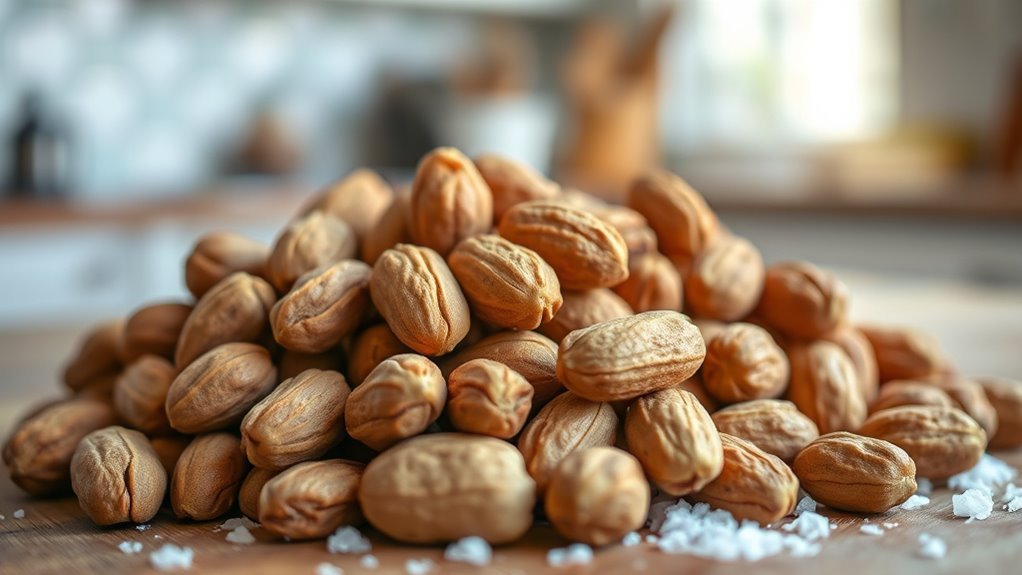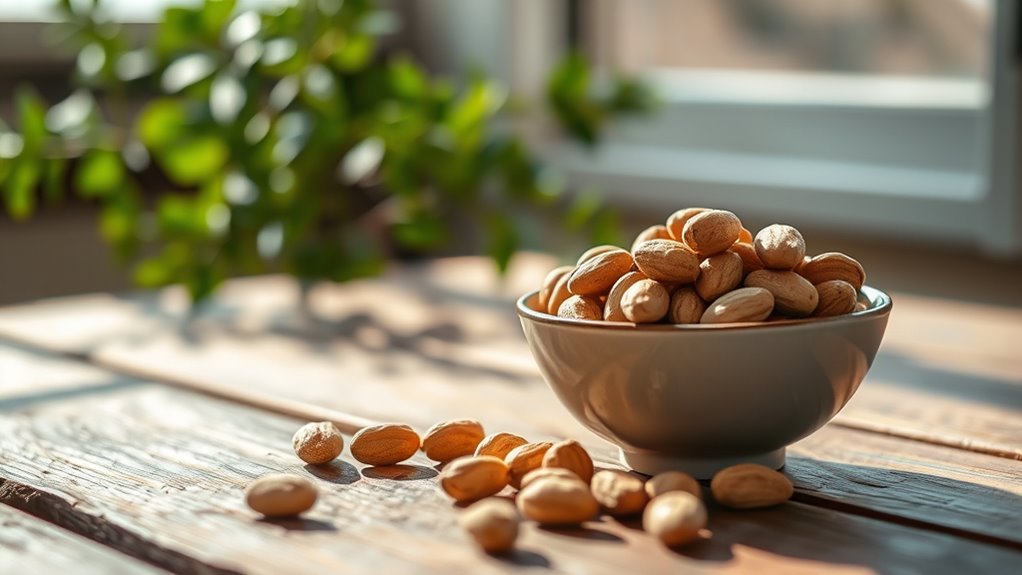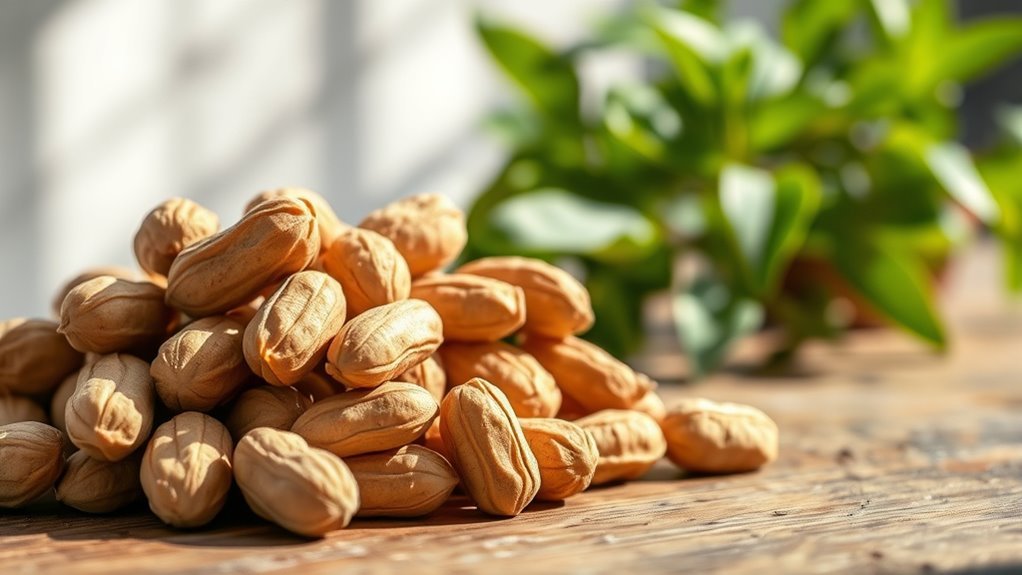Yes, peanuts are keto-friendly! They provide a high-fat, moderate-protein profile that fits well within the keto guidelines. With approximately 14 grams of fat and only 6 grams of net carbs per 28-gram serving, they can be a tasty and satisfying snack. However, it’s important to watch your portion sizes to avoid excessive calorie intake. If you’re curious about incorporating peanuts into your diet and their potential benefits, there’s more to explore!
Understanding the Keto Diet

When you immerse yourself in the keto diet, you’ll find it’s a low-carb, high-fat eating plan designed to shift your body into a state of ketosis, where it primarily burns fat for energy instead of carbohydrates. Understanding the keto basics is vital to success; this includes knowing the right macronutrient ratios and making smart food choices. Many diet misconceptions suggest that you can eat unlimited fat or that all carbs are bad. In reality, the quality of your fats and the types of carbs you consume matter greatly. Embracing whole foods while avoiding processed items can enhance your results. By demystifying these myths, you’ll enjoy greater freedom and empowerment on your keto journey, leading to sustainable health benefits.
Nutritional Profile of Peanuts

When you consider peanuts as a keto-friendly snack, their nutritional profile is essential. They offer a solid macronutrient breakdown, with a high fat content and moderate protein, making them suitable for your diet. Plus, their fiber content can help keep you feeling full and satisfied.
Macronutrient Breakdown
Although peanuts are often enjoyed as a tasty snack, their nutritional profile makes them particularly appealing for those following a keto diet. A typical serving of peanuts (about 28 grams) contains roughly 14 grams of fat, 6 grams of protein, and only 6 grams of carbohydrates. This macronutrient breakdown supports a low-carb lifestyle, making peanuts a great option among various peanut varieties when you’re craving keto snacks. Additionally, the high fat content provides a satisfying energy source, while the protein helps maintain muscle mass. Keep in mind that moderation is key, as portion sizes can impact your overall carb intake. Incorporating peanuts into your diet can enhance both flavor and nutritional value while staying aligned with your keto goals.
Fiber and Protein Content
Peanuts stand out not just for their healthy fat content but also for their impressive fiber and protein levels. When you’re considering fiber sources and protein benefits, peanuts offer a solid nutritional profile that can support your keto journey.
Here’s what you get from a serving of peanuts:
- Protein: About 7 grams, helping with muscle maintenance and satiety.
- Fiber: Roughly 2.4 grams, aiding digestion and promoting gut health.
- Healthy Fats: Contributing to overall calorie intake while keeping carbs low.
- Micronutrients: Packed with vitamins and minerals like magnesium and vitamin E.
Incorporating peanuts into your diet can provide these essential nutrients while keeping you aligned with your keto goals.
Carb Content in Peanuts

When considering peanuts for your keto diet, it’s important to look at their nutritional profile, particularly their carb content. Peanuts contain about 6 grams of total carbohydrates per ounce, but with fiber factored in, their net carbs drop to around 4 grams. Portion control is vital to keep your carb intake in check while enjoying this nutritious snack.
Peanuts Nutritional Profile
While you might think of peanuts primarily as a snack, their nutritional profile reveals a surprising balance of macronutrients, particularly when it comes to carbohydrates. Here’s a quick look at their carb content:
- Total Carbohydrates: About 16 grams per 100 grams.
- Dietary Fiber: Roughly 8 grams, aiding digestion.
- Net Carbs: With fiber included, the net carbs can be markedly lower, depending on the peanut varieties.
- Healthy Fats: Peanuts are rich in healthy fats, making them a satisfying option for those following a keto lifestyle.
Net Carbs Calculation
To effectively manage your carb intake on a keto diet, understanding the net carbs in peanuts is essential. Peanuts contain about 6 grams of total carbohydrates per ounce, but with approximately 2 grams of dietary fiber, the net carbs come down to around 4 grams. This makes peanuts relatively low in net carbs compared to many other snacks. When you do a net carbs comparison, you’ll find that peanuts can be a viable option if consumed in moderation. However, if you’re looking for keto snack alternatives, consider options like cheese crisps or pork rinds, which may offer even lower net carbs. Balancing your choices can help you stay within your carb limits while enjoying satisfying snacks.
Portion Control Importance
Understanding the role of portion control is essential, especially since peanuts, despite their keto-friendly net carb count, can quickly add up if you’re not careful. Practicing mindful eating will help you enjoy peanuts while maintaining your carb limits. Here are some tips for controlling your serving sizes:
- Stick to 1 ounce – This serving size contains about 6 grams of net carbs.
- Measure your portions – Use a food scale or measuring cups to avoid overindulging.
- Mind your snacks – Instead of munching straight from the bag, portion out a serving beforehand.
- Track your intake – Keep a food diary or app to monitor your carb consumption effectively.
Health Benefits of Peanuts
Peanuts offer a wealth of health benefits that make them a great addition to a keto-friendly diet. They’re rich in healthy fats, protein, and essential nutrients, promoting satiety and helping you maintain energy levels. Regular peanut consumption supports heart health; studies show that they can lower bad cholesterol and reduce the risk of heart disease. Additionally, peanuts contain antioxidants like resveratrol, which may help combat inflammation. However, if you’re prone to peanut allergies, it’s important to exercise caution, as they can trigger severe reactions in some individuals. Overall, incorporating peanuts into your diet can provide a delicious way to enhance your nutritional intake while aligning with your keto goals, all while being mindful of those allergy concerns.
Peanuts vs. Other Nuts on Keto
While many nuts can fit into a keto diet, peanuts stand out for their unique nutritional profile and cost-effectiveness. When making nutritional comparisons, consider these important factors:
- Carbohydrates: Peanuts contain about 6 grams of net carbs per ounce, lower than cashews (about 9 grams).
- Fats: Peanuts offer a healthy fat content, similar to almonds and walnuts, promoting satiety.
- Protein: They’re rich in protein, providing about 7 grams per ounce, making them a solid choice compared to most other nuts.
- Cost: Peanuts are often more affordable than other keto-friendly alternatives like macadamia nuts or pecans.
Incorporating peanuts into your keto plan can help you enjoy variety without breaking the bank.
Portion Control and Serving Sizes
When it comes to enjoying peanuts on a keto diet, portion control is essential for staying within your carb limits. Knowing the right portion sizes helps you indulge without jeopardizing your progress. Here are some serving recommendations to keep in mind:
| Serving Size | Carbs (g) | Suggested Frequency |
|---|---|---|
| 1 oz (28g) | 6 | Daily |
| 2 oz (56g) | 12 | Every other day |
| 3 oz (84g) | 18 | Limit to once a week |
Creative Ways to Incorporate Peanuts Into Your Diet
Incorporating peanuts into your keto diet can be both delicious and satisfying, especially if you get creative with their use. Here are some ideas to enjoy peanuts while staying on track:
Incorporating peanuts into your keto diet adds delicious variety and satisfaction—get creative with these tasty ideas!
- Peanut Butter Recipes: Whip up low-carb peanut butter cookies or use peanut butter in fat bombs for a sweet treat.
- Peanut Snacks: Roast peanuts with spices for a crunchy snack, or make your own trail mix with keto-friendly ingredients.
- Peanut Smoothies: Blend unsweetened peanut butter with almond milk, spinach, and a low-carb sweetener for a nutritious smoothie.
- Peanut Sauces: Create a rich peanut sauce for drizzling over grilled meats or veggies, enhancing flavor without the carbs.
These options make it easy to enjoy peanuts while adhering to your keto lifestyle!
Potential Drawbacks of Eating Peanuts on Keto
Although peanuts can be a tasty addition to your keto diet, there are some potential drawbacks to evaluate. One major concern is peanut allergies, which can lead to severe reactions in sensitive individuals. Additionally, while peanuts are low in carbs, they’re relatively high in calories and can contribute to potential weight gain if consumed in excess.
Here’s a quick overview of these drawbacks:
| Potential Drawbacks | Description |
|---|---|
| Peanut Allergies | Risk of severe allergic reactions |
| High-Calorie Content | Can lead to increased calorie intake |
| Possible Overeating | Easy to consume in large quantities |
| Nutrient Imbalance | May displace other nutrient-dense foods |
| Digestive Issues | Can cause bloating or discomfort |
Consider these factors when deciding how to include peanuts in your keto lifestyle.
Are peanuts keto-friendly?
Yes, peanuts can be considered keto-friendly. They are relatively low in carbohydrates, with about 6 grams of net carbs per ounce. Additionally, peanuts are high in healthy fats and protein, making them a suitable snack for those following a ketogenic diet. However, it’s important to moderate your portion sizes to stay within your daily carb limit.
How many carbs are in peanuts?
One ounce of peanuts (approximately 28 grams) contains about 6 grams of net carbs. This is calculated by subtracting the fiber content (around 2 grams) from the total carbohydrates (approximately 8 grams). This low carb count makes peanuts a popular choice for those on a keto diet.
Can I eat peanut butter on a keto diet?
Yes, peanut butter can be part of a ketogenic diet, but it’s essential to choose natural, unsweetened varieties. Many commercial peanut butter brands add sugar or other carbohydrates, which can increase the carb count significantly. Look for options that contain only peanuts and possibly salt to keep your carb intake low.
Are there any downsides to eating peanuts on a keto diet?
While peanuts are low in carbs, they are also relatively high in omega-6 fatty acids, which can promote inflammation if consumed in excess. Additionally, some individuals may experience allergic reactions or digestive issues from peanuts. Moderation is key, and it’s best to balance your diet with a variety of nuts and seeds to ensure you’re getting a broader range of nutrients.
What are some keto-friendly alternatives to peanuts?
If you’re looking for keto-friendly alternatives to peanuts, consider options such as almonds, macadamia nuts, pecans, or walnuts. These nuts are also low in carbohydrates and rich in healthy fats. Additionally, seeds such as chia seeds, flaxseeds, and pumpkin seeds can be excellent choices to include in your diet for variety and nutrition.
References
- https://www.healthline.com/nutrition/are-peanuts-keto-friendly
- https://www.medicalnewstoday.com/articles/323596
- https://www.ncbi.nlm.nih.gov/pmc/articles/PMC6342116/
- https://www.webmd.com/diet/health-benefits-peanuts
- https://www.verywellfit.com/peanuts-on-a-keto-diet-5190494
- https://www.bbcgoodfood.com/howto/guide/peanuts-are-they-healthy
- https://www.nutrition.gov/topics/food-choices/nuts-and-peanuts
- https://www.aicr.org/cancer-research/learn-about-cancer/nutrition/cancer-facts/peanuts-and-health.html


